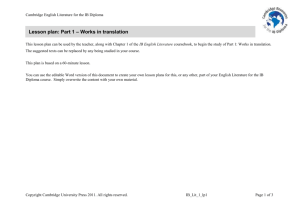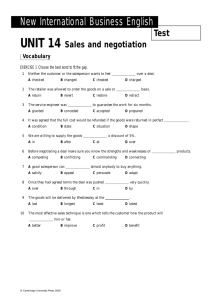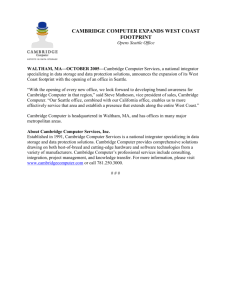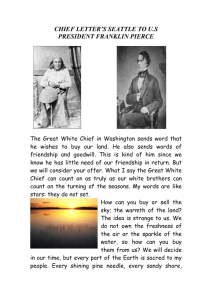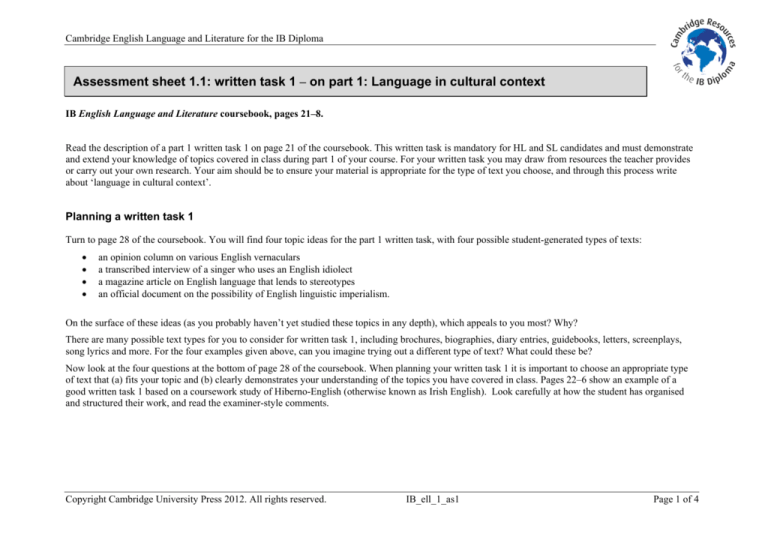
Cambridge English Language and Literature for the IB Diploma
Assessment sheet 1.1: written task 1 – on part 1: Language in cultural context
IB English Language and Literature coursebook, pages 21–8.
Read the description of a part 1 written task 1 on page 21 of the coursebook. This written task is mandatory for HL and SL candidates and must demonstrate
and extend your knowledge of topics covered in class during part 1 of your course. For your written task you may draw from resources the teacher provides
or carry out your own research. Your aim should be to ensure your material is appropriate for the type of text you choose, and through this process write
about ‘language in cultural context’.
Planning a written task 1
Turn to page 28 of the coursebook. You will find four topic ideas for the part 1 written task, with four possible student-generated types of texts:
an opinion column on various English vernaculars
a transcribed interview of a singer who uses an English idiolect
a magazine article on English language that lends to stereotypes
an official document on the possibility of English linguistic imperialism.
On the surface of these ideas (as you probably haven’t yet studied these topics in any depth), which appeals to you most? Why?
There are many possible text types for you to consider for written task 1, including brochures, biographies, diary entries, guidebooks, letters, screenplays,
song lyrics and more. For the four examples given above, can you imagine trying out a different type of text? What could these be?
Now look at the four questions at the bottom of page 28 of the coursebook. When planning your written task 1 it is important to choose an appropriate type
of text that (a) fits your topic and (b) clearly demonstrates your understanding of the topics you have covered in class. Pages 22–6 show an example of a
good written task 1 based on a coursework study of Hiberno-English (otherwise known as Irish English). Look carefully at how the student has organised
and structured their work, and read the examiner-style comments.
Copyright Cambridge University Press 2012. All rights reserved.
IB_ell_1_as1
Page 1 of 4
Cambridge English Language and Literature for the IB Diploma
Practising a written task 1
Let’s assume you had studied Chief Seattle’s letter to United States president Franklin Pierce, written in 1855. The following is an excerpt – you can refer to
the full letter at http://www.context.org/ICLIB/IC03/Seattle.htm
The Great Chief in Washington sends word that he wishes to buy our land. The Great Chief also sends us words of friendship and
good will. This is kind of him, since we know he has little need of our friendship in return. But we will consider your offer, for we
know if we do not so the white man may come with guns and take our land. What Chief Seattle says you can count on as truly as our
white brothers can count on the return of the seasons. My words are like the stars – they do not set.
How can you buy or sell the sky – the warmth of the land? The idea is strange to us. Yet we do not own the freshness of the air or
the sparkle of the water. How can you buy them from us? We will decide in our time. Every part of this earth is sacred to my people.
Every shining pine needle, every sandy shore, every mist in the dark woods, every clearing, and every humming insect is holy in the
memory and experience of my people.
We know that the white man does not understand our ways. One portion of land is the same to him as the next, for he is a stranger
who comes in the night and takes from the land whatever he needs. The earth is not his brother, but his enemy, and when he has
conquered it, he moves on. He leaves his father’s graves and his children’s birthright is forgotten. The sight of your cities pains the
eyes of the redman. But perhaps it is because the redman is a savage and does not understand.
There is no quiet place in the white man’s cities. No place to listen to the leaves of spring or the rustle of insect wings. But perhaps
because I am a savage and do not understand – the clatter only seems to insult the ears. And what is there to life if a man cannot hear
the lovely cry of the whippoorwill or the arguments of the frogs around a pond at night? The Indian prefers the soft sound of the
wind itself cleansed by a mid-day rain, or scented by a pinõn pine: The air is precious to the redman. For all things share the same
breath – the beasts, the trees, and the man. The white man does not seem to notice the air he breathes. Like a man dying for many
days, he is numb to the stench.
If I decide to accept, I will make one condition. The white man must treat the beasts of this land as his brothers. I am a savage and I
do not understand any other way. I have seen thousands of rotting buffaloes on the prairie left by the white man who shot them from
a passing train. I am a savage and do not understand how the smoking iron horse can be more important than the buffalo that we kill
only to stay alive. What is man without the beasts? If all the beasts were gone, men would die from great loneliness of spirit, for
whatever happens to the beast also happens to the man.
Copyright Cambridge University Press 2012. All rights reserved.
IB_ell_1_as1
Page 2 of 4
Cambridge English Language and Literature for the IB Diploma
A written task 1 may be based on this text and its cultural context. You could begin your planning by writing your own questions and answering
them. For example:
What are the circumstances leading to the writing of this letter?
Who is Franklin Pierce, besides his title as ‘president’? Have President Pierce and Chief Seattle ever met?
Are ‘redman’ and ‘white man’ clear and accurate terms? What about ‘savage’?
Why is one form of killing buffalo different from another? Does this image stand as an analogy?
Copyright Cambridge University Press 2012. All rights reserved.
IB_ell_1_as1
Page 3 of 4
Cambridge English Language and Literature for the IB Diploma
Now, as advised on page 28 of the coursebook, decide what type of text you plan to write. Your teacher’s guidance and the work you have done in
class may help with this, but ultimately you are the one who will decide your own type of text. For the purposes of this example, you might:
write a response letter from the perspective of President Pierce
make up song lyrics highlighting the ironic cadence ‘I am a savage and I do not understand’
imagine an interview with present-day descendants of Chief Seattle’s tribe.
Then write down your idea for your type of text for this written task, with a second idea as a back-up.
Your idea:
Your back-up idea:
As you begin writing, think about how to reinforce your sense of the topic. This part of the course studies ‘English language in cultural context’, so you
should make sure you emphasise the manner in which English language is used as well as an understanding of culture. For the purposes of this example, you
might reinforce the following:
linguistic imperialism
definitions of social identities and values
application of cultural imagery.
Now draft your written task! Be sure to draw in specific references from the original text and provide a full citation at the end. Monitor how your work
matches the assessment criteria, as expressed in the examiner’s comments on the sample task on page 26 of the coursebook.
Your written task 1 must be 800–1000 words in length, and a separate rationale (describing for the examiner what you intend to do, and why) must be 200–
300 words.
Copyright Cambridge University Press 2012. All rights reserved.
IB_ell_1_as1
Page 4 of 4

